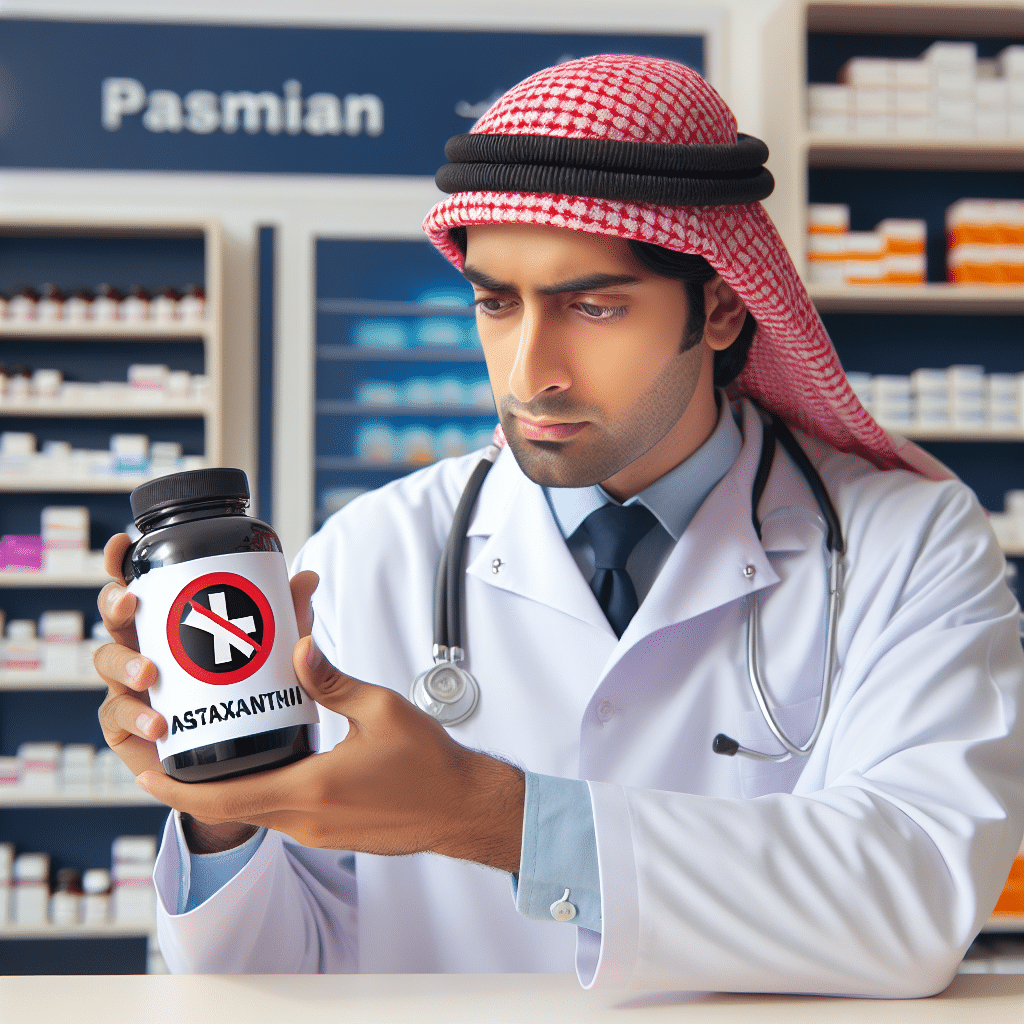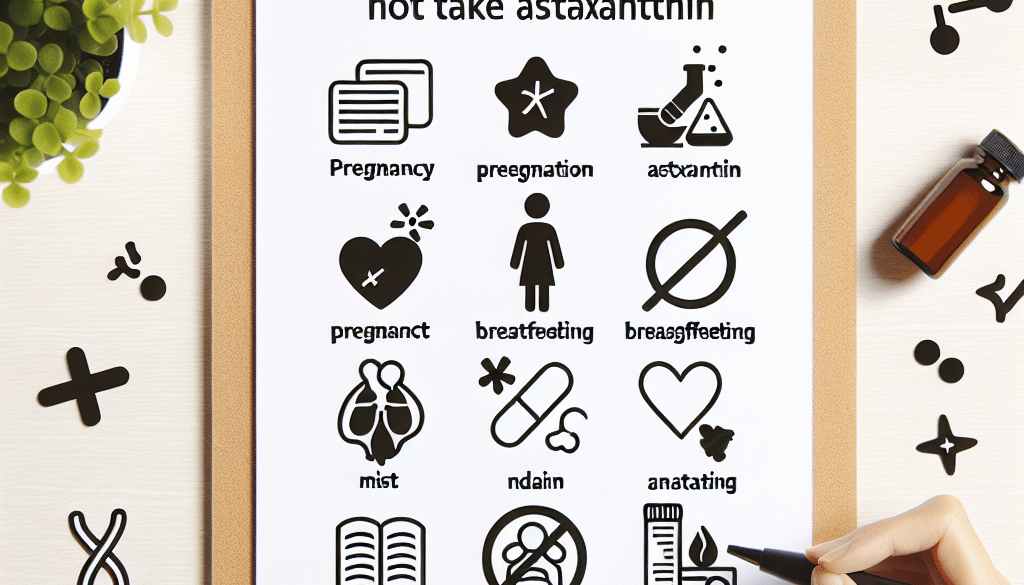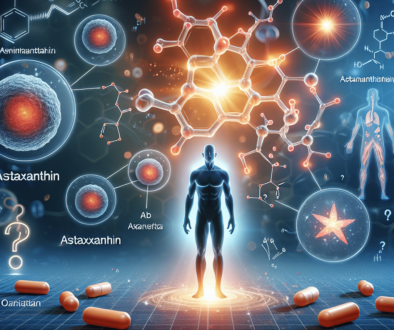When should you not take astaxanthin?
-
Table of Contents
- Astaxanthin Intake: Knowing When to Avoid This Powerful Antioxidant
- Understanding Astaxanthin and Its Uses
- When to Exercise Caution with Astaxanthin
- Pregnancy and Breastfeeding
- Autoimmune Diseases
- Medication Interactions
- Pre-existing Hormone-sensitive Conditions
- Pre-surgery Considerations
- Allergies to Astaxanthin or Source Ingredients
- Understanding the Right Dosage and Potential Side Effects
- Conclusion: Balancing Benefits with Precautions
- Explore ETprotein’s High-Quality Protein Products
Astaxanthin Intake: Knowing When to Avoid This Powerful Antioxidant

Astaxanthin, a naturally occurring carotenoid found in certain marine plants and animals, has gained popularity as a dietary supplement due to its potent antioxidant properties. It’s known for its potential benefits, including supporting skin health, enhancing athletic performance, and promoting eye health. However, as with any supplement, there are specific situations where taking astaxanthin may not be advisable. This article explores the circumstances under which you should consider avoiding astaxanthin and provides insights into its safe usage.
Understanding Astaxanthin and Its Uses
Astaxanthin is a keto-carotenoid that gives salmon, shrimp, and flamingos their distinctive pink and red hues. It’s also available as a supplement derived from microalgae like Haematococcus pluvialis. Astaxanthin’s antioxidant capabilities are said to be many times more powerful than other carotenoids like beta-carotene and lutein, making it a sought-after supplement for those looking to combat oxidative stress and inflammation.
When to Exercise Caution with Astaxanthin
Despite its benefits, there are certain conditions and scenarios where astaxanthin may not be suitable. Here are some instances where you should be cautious about its intake:
Pregnancy and Breastfeeding
There is limited research on the effects of astaxanthin during pregnancy and breastfeeding. Due to the lack of conclusive evidence, it is generally recommended that pregnant and breastfeeding women avoid astaxanthin supplements to prevent any potential risks to the baby.
Autoimmune Diseases
Individuals with autoimmune conditions such as rheumatoid arthritis or lupus should be cautious with astaxanthin. While some studies suggest that its anti-inflammatory properties could be beneficial, there is also a concern that astaxanthin could stimulate the immune system and potentially exacerbate autoimmune symptoms.
Medication Interactions
Astaxanthin may interact with certain medications, potentially altering their effects. For example:
- Blood thinners (anticoagulants): Astaxanthin may enhance the blood-thinning effects, increasing the risk of bleeding.
- Antihypertensive drugs: It may have additive effects with medications that lower blood pressure, leading to hypotension.
- Hormone therapies: Astaxanthin could potentially interfere with hormone levels and the effectiveness of hormone treatments.
Always consult with a healthcare provider before taking astaxanthin if you are on any medication.
Pre-existing Hormone-sensitive Conditions
Because astaxanthin can have mild estrogenic effects, individuals with hormone-sensitive conditions such as breast cancer, uterine cancer, ovarian cancer, endometriosis, or uterine fibroids should avoid astaxanthin or consult with a healthcare professional before use.
Pre-surgery Considerations
Due to its potential blood-thinning properties, astaxanthin should be discontinued at least two weeks before any scheduled surgery to reduce the risk of excessive bleeding.
Allergies to Astaxanthin or Source Ingredients
Those with known allergies to astaxanthin or its source ingredients, such as Haematococcus pluvialis algae or other carotenoids, should avoid astaxanthin supplements to prevent allergic reactions.
Understanding the Right Dosage and Potential Side Effects
For those who can safely take astaxanthin, it’s crucial to adhere to the recommended dosage. Most studies have used doses ranging from 4 to 12 mg per day, which are generally considered safe for most people. However, high doses may cause side effects such as:
- Increased skin pigmentation or a slight change in skin color
- Hormonal changes, particularly when taken in high doses
- Gastrointestinal discomfort
It’s essential to start with a lower dose and gradually increase it if necessary, under the guidance of a healthcare provider.
Conclusion: Balancing Benefits with Precautions
Astaxanthin is a powerful antioxidant with a range of potential health benefits. However, it’s not suitable for everyone. Pregnant and breastfeeding women, individuals with autoimmune diseases, those on certain medications, people with hormone-sensitive conditions, and anyone scheduled for surgery should exercise caution or avoid astaxanthin altogether. Always consult with a healthcare professional before starting any new supplement, including astaxanthin, to ensure it’s safe for your specific health situation.
For those looking for alternative sources of nutrition and supplements, ETprotein offers a variety of protein products that may complement your dietary needs.
Explore ETprotein’s High-Quality Protein Products
If you’re seeking high-quality protein supplements, ETprotein’s range of organic bulk vegan proteins and L-(+)-Ergothioneine (EGT) products could be an excellent addition to your diet. Their offerings are non-GMO, allergen-free, and characterized by a neutral taste, making them suitable for various dietary preferences and needs.
Whether you’re involved in sports nutrition, weight management, or general health and wellness, ETprotein provides comprehensive solutions to meet your protein requirements. Their commitment to quality and customer satisfaction makes them a trusted supplier for consumers and businesses alike.
About ETprotein:
ETprotein, a reputable protein and L-(+)-Ergothioneine (EGT) Chinese factory manufacturer and supplier, is renowned for producing, stocking, exporting, and delivering the highest quality organic bulk vegan proteins and L-(+)-Ergothioneine. They include Organic rice protein, clear rice protein, pea protein, clear pea protein, watermelon seed protein, pumpkin seed protein, sunflower seed protein, mung bean protein, peanut protein, and L-(+)-Ergothioneine EGT Pharmaceutical grade, L-(+)-Ergothioneine EGT food grade, L-(+)-Ergothioneine EGT cosmetic grade, L-(+)-Ergothioneine EGT reference grade and L-(+)-Ergothioneine EGT standard. Their offerings, characterized by a neutral taste, non-GMO, allergen-free attributes, with L-(+)-Ergothioneine purity over 98%, 99%, cater to a diverse range of industries. They serve nutraceutical, pharmaceutical, cosmeceutical, veterinary, as well as food and beverage finished product distributors, traders, and manufacturers across Europe, USA, Canada, Australia, Thailand, Japan, Korea, Brazil, and Chile, among others.
ETprotein specialization includes exporting and delivering tailor-made protein powder and finished nutritional supplements. Their extensive product range covers sectors like Food and Beverage, Sports Nutrition, Weight Management, Dietary Supplements, Health and Wellness Products, and Infant Formula, ensuring comprehensive solutions to meet all your protein needs.
As a trusted company by leading global food and beverage brands and Fortune 500 companies, ETprotein reinforces China’s reputation in the global arena. For more information or to sample their products, please contact them and email sales(at)ETprotein.com today.











